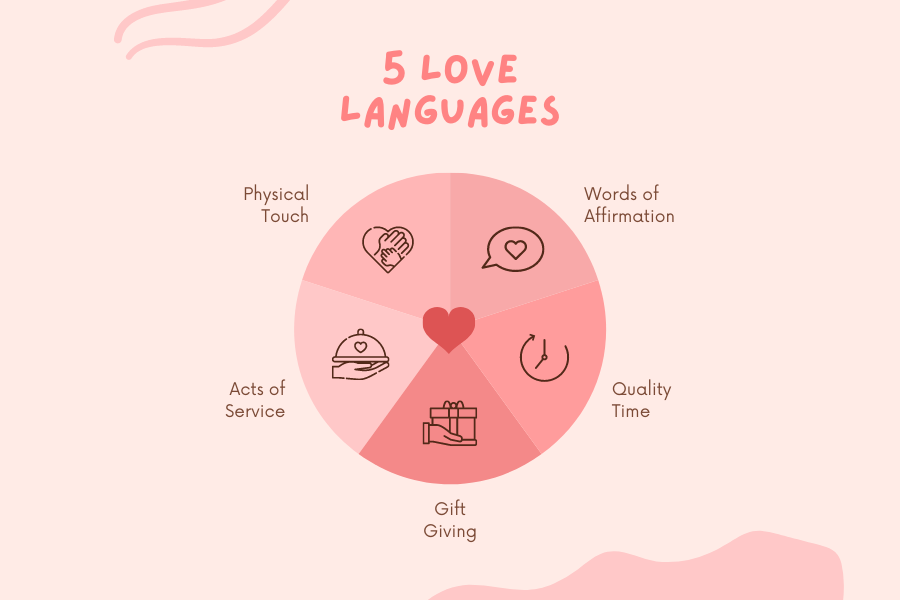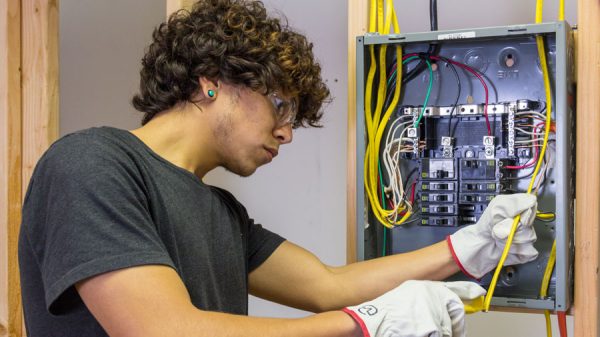Self-care through your love language
Want to find happiness with others? It starts with finding joy with yourself.
Photo courtesy of balance.media
The five love languages, from Dr. Gary Chapman’s bestselling 1992 novel
May 9, 2022
People spend so much time worrying about how to care for others in the way they like to be loved, so much so that loving themselves becomes an afterthought, if not forgotten altogether. The problem is that we cannot guarantee that other people will be actively trying to love us. However, we can make a commitment to ourselves by finding self-love through our love languages.
While some people might struggle to find a way to care for themselves, others have a less self-esteem and don’t realize they are worthy of care; every single person deserves to be loved, and the best place this love can come from is yourself. Trying to find love in external places, or to forget about love through other forums like substance abuse, only leads a person to more misery.
Most likely, if you have done things in the past you are not proud of, those things may stem from self-hatred itself. If you cannot love yourself, you do not have the ability to take care of yourself and evaluate yourself for everything you are.
Although some people are hesitant to engage in self-love, the absence of it can be detrimental to mental health. In Philosophy doctoral candidate Jochen Gebauer’s paper, “The Relationship Between Self-Esteem and Psychological Health,” he says, “In four studies, we found that chronically happy people assimilated towards a recalled positive self and contrasted away from a recalled negative self, which in both cases lead to a relative increase in self-esteem. Chronically sad people, on the other hand, assimilated towards a recalled negative self and contrasted away from a recalled positive self, which in both cases lead to a relative decrease in self-esteem.”
Self-esteem goes beyond a person’s confidence in their abilities in certain activities, and rather deals with the perception of themselves they have despite their abilities. Without being kind to themselves, people find themselves bogged down by the negativity they carry with them. Learning to have self-love is not some obstacle you face; it is the tool that will enable you to take care of yourself so you can have control in your life.
So if the key to happiness is to have a positive self, how can we learn to love ourselves? More importantly, how can we learn to apply this love of ourselves?
Like anything in life, learning to love yourself takes practice. If you’ve heard about love languages, maybe you have craved a certain type of affection from an external source and have not received it. If you crave a certain type of affection, the solution isn’t to find someone to fill that void for you. Instead, it is to find a way to create it for yourself.
Before you can apply a love language to your life, you must first understand the different types of love languages and which one calls out to you.
In 1992, Dr. Gary Chapman wrote “The 5 Love Languages,” which outlines the five types of ways people respond to love as words of affirmation, quality time, physical touch, acts of service, and receiving gifts. Someone whose main love language is words of affirmation likes kind spoken words and encouragement. Meanwhile, someone who primarily enjoys quality time may want undivided attention. For those who primarily have the love language physical touch, they enjoy acts of physical affection, even as simple as hand holding. In acts of service, a person with this love language appreciates small favors someone does for them. Finally, receiving gifts is a straight forward symbol of appreciation.
By practicing self-love despite how you feel currently, you can learn to care for yourself—and mean it.
Words Of Affirmation: If you crave other people to reassure you constantly, you can instead find ways to reassure yourself. For example, the practice of daily positive affirmations can help teach you to reframe negative thoughts. You can journal these affirmations and positive things about yourself, or simply think or say them to yourself. The main goal is to limit negative self-talk and instead become your own biggest supporter.
Quality Time: To embrace your quality time, the biggest component is finding time for yourself without overdoing it. A daily meditation practice is a great way to stay present. If meditation is not for you, making time for any of your hobbies is a way to spend quality time with yourself. If you’re not sure what to do, try coloring or even a paint-by-number. Connect with your inner peace and happiness.
Physical Touch: Feeling lonely may lead a lot of people to yearn for physical affection, but simple activities like stretching or moisturizing your skin can be a suitable alternative you can do by yourself. Even wearing comfortable clothing or taking a warm bath can be extremely beneficial.
Acts of Service: Although other people’s favors can mean a lot, doing yourself a favor can be just as helpful. Making life easier for yourself through preparation methods is one of the best ways to help yourself. Whether it’s getting your room cleaned or preparing a healthy meal for later, it will make living in your environment much easier later on.
Receiving Gifts: There are so many ways to give things to yourself. For example, you can start putting thought into what you buy for your home. You can buy things for your room, but make sure they are things you love or mean something to you. Even giving yourself a new experience by doing something fun can be a way to simultaneously use quality time and receive gifts of love with language. If none of this appeals to you, buy yourself flowers, order take-out, or do anything else that falls under the category of treating-yourself.
Many students echo the advice of psychologists and doctors about the importance of finding your own love language for yourself.
“It all comes down to one Mac Miller quote. ‘Self-care, I’m treatin’ me right,’” said junior Ryan Kilpatrick.
It’s hard at first to learn to love yourself, but the more you practice, the closer you are to raising your self-esteem. Once you find love within yourself, it will be easier to love the world around you. Who knew—the key to happiness has been within you this whole time.












